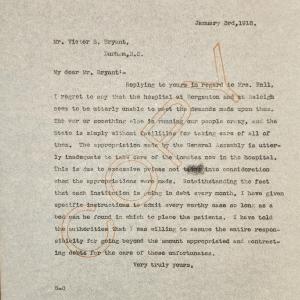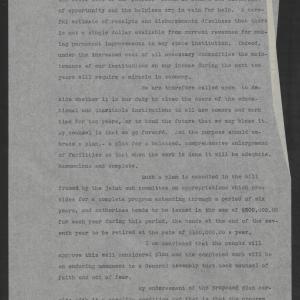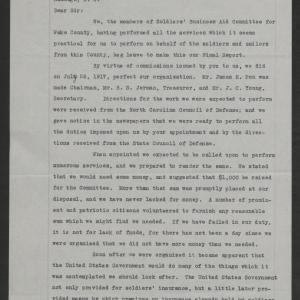- Transcription
STATE LABORATORY OF HYGIENE
RALEIGH, N.C.
August 3, 1920.
Hon. T. W. Bickett,
Raleigh, N.C.
Dear Governor:-
The State Laboratory of Hygiene faces the prospect of an inevitable deficit and it has been suggested that I seek your aid and counsel as to the advisability of requesting help from the legislature at its approaching special session. At the last session the legislature gave us exactly the amount asked for and this amount was just what we had by close calculation estimated would be needed. We had calculated on the gradual increased demand for the laboratory service and the laboratory products but this demand has exceeded our calculations by far and we had not counted on the continued and enormous increase in price of all laboratory supplies and on the increase of wages and salaries. In order to keep running at all we found it absolutely necessary to increase all wages paid and even now we are in constant uncertainty about our personnel, as the opportunities are so much greater elsewhere. When a young man gives up his position in the laboratory at $900. per year and makes $4,000 the first year thereafter, it is easy to understand that all the remaining staff will be dissatisfied.
These various causes have combined to increase expenses so that we will have by December 1st a deficit for the two years of about $10,000. We have realized for some time that this was coming, but have thought it best to go right ahead and not to curtail any of the work of the laboratory until it was necessary.
The laboratory has an advantage over many other of the public institutions in that it can so easily demonstrate the work it has accomplished. I beg to enclose a brief synopsis of the work of the laboratory during the fiscal year ending November 30, 1919. In this synopsis no attempt is made to estimate any value except the financial one. You will permit me, however, to refer to only one accomplishment which by itself justifies all the cost and all the labor of the laboratory since its foundation. I refer to the typhoid vaccine work. The making of this vaccine and its free distribution has resulted in such a remarkable reduction of typhoid fever that this disease is becoming a rare one in our State. It is impossible to estimate the value of this one accomplishment.
To confine ourselves only to the more easily estimated figures of cost of operation and cash value of the work done, we find that during the last fiscal year the laboratory on an income of $38,219.97 has returned to the State $374,130.25 in services. Any interruption of the work of the laboratory would result not only in the temporary failure to function but it would take many months to regain its full efficiency. On these grounds we are emboldened to most respectfully ask your help and advice.
Very respectfully yours,
C. A. Shore
Director, State Laboratory of Hygiene.
Mc.






